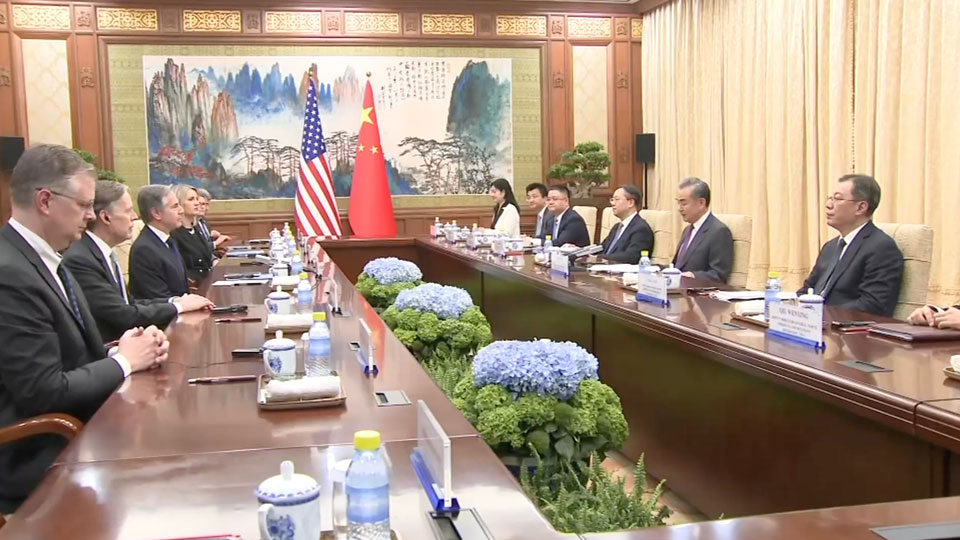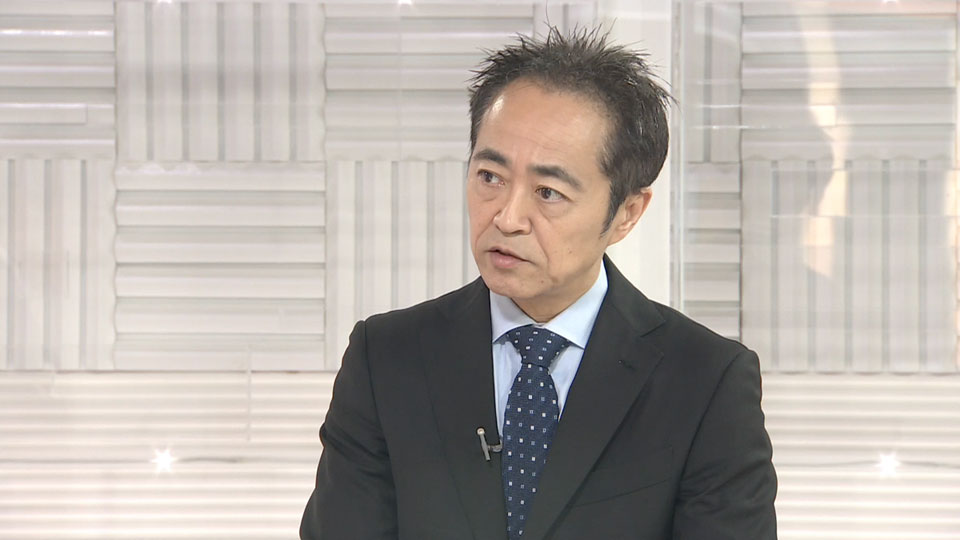On April 26, US Secretary of State Antony Blinken met with Chinese Foreign Minister Wang Yi in Beijing. Since the summit meeting last November in California, a series of high-level meetings have taken place, with both the US and China showing a non-negotiable stance.
What is the stance of Beijing and Washington in the current talks, and what are their plans for bilateral relations? We asked NHK World’s correspondent in Beijing, Nakamura Genta, and international politics commentator Hanazawa Yuichiro, respectively.
Beijing’s view
NHK World’s Nakamura Genta has been covering the talks. Here’s his analysis on Beijing’s view of the meeting.
Q: How is Blinken’s trip being received there?
Nakamura Genta: I think China is embracing the chance to stabilize its relationship with the US. Both countries seem united in trying to control the risk of a confrontation, and China appears to be taking this visit very seriously.
Central Beijing’s streets were blocked and heavily guarded when we watched a convoy of vehicles, presumably carrying Blinken, driving through yesterday.
Even before his plane touched down here, the challenges for these talks were apparent.
Blinken landed just hours after the US Senate passed a bill providing billions of dollars in aid to Taiwan.
New US legislation also includes a ban on the popular video-sharing app TikTok, unless it’s sold by its Chinese operator, ByteDance.
And just last week, US President Joe Biden called for a tripling of tariffs on Chinese steel and aluminum. China knows these kinds of moves could be part of Biden’s strategy to look tough ahead of this year’s presidential election.
But it’s also hoping there’s room for negotiation. China wants to bring back strong exports to counter its sluggish real estate industry and weak consumer spending.
Blinken’s visit is a chance to move that goal forward.
Q: Returning to regional security, how do we expect Beijing to respond to US pressure on issues related to Taiwan and the South China Sea?
Nakamura: So far, China has not budged on this stance: It sees the Taiwan issue as part of its “core interests.” I don’t think that will change with these talks.
Beijing has made it clear that it’s unsettled by the US strategy, even arguing Biden is repeating the Cold War-era playbook of containment used against the Soviet Union.
But we should note Blinken is visiting as the US-China relationship appears more stable than a year ago.
China has signaled it does not want either side to cross any “red lines” when it comes to Taiwan.
We even saw US and Chinese defense chiefs hold an online meeting last week, aimed at boosting communication to prevent a confrontation.
I think Beijing is also trying to convince Washington to ease national security-related controls on advanced technology exports.
Last November, President Xi Jinping even told Biden, in-person, that more restrictions could “deprive the Chinese people of their right to development.”
At the same time, we’re expecting Blinken will urge China to get its firms to stop supplying Russia with goods that have both civilian and military uses.
Finding that middle ground will be tricky, especially with Russia’s president set to visit next month.
Washington’s view
We asked NHK World’s International Politics Commentator, Hanazawa Yuichiro, for the view from Washington.
Q: Blinken is urging China to stop supplying Russia with goods that could support its military. Why is this significant?
Hanazawa Yuichiro: The US is concerned that China’s growing influence could shift the world order. They are also accusing China of bolstering Russia’s capabilities in Ukraine. So, they see it as critical to cut ties between China and Russia. However, real progress on this is unlikely. At the moment, China seems to be looking to counter the US by deepening ties with Russia.

Q: Another major focus for Blinken is Taiwan. China is not likely to budge in its position. What about the US?
Hanazawa: The US also has no intention of compromise on Taiwan. There are two reasons. One is that the US presidential election is only six months away. The perception of China in the US is deteriorating. Biden and former President Donald Trump are both trying to appear tough on China ahead of the election. The Biden administration cannot make concessions on China.
Also, the US has a heightened sense of urgency around Taiwan. This month, a source with intel on US-Japan security told me, “The US military is hurrying preparations on the assumption that there will be a Taiwan contingency as early as next year.”
China is rapidly building up its military power. And the US believes China is gradually changing the status quo as Chinese fighter jets repeatedly cross the median line across the Taiwan Strait, which had been protected in the past.
From the beginning of his presidency, Biden has sought to deter China from an invasion of Taiwan. We’ve seen this through economic pressure, around cutting-edge technology including semiconductors.
And to add to that, the US is now conducting joint military exercises in the Philippines.

Q: Can you expand on this? What is the US military doing in the Philippines?
Hanazawa: The US is also nervous about China’s behavior in the South China Sea. But the main focus of the US military this time is preparation and enhancing deterrence for a possible Taiwan contingency.
Recently, it brought a missile launch system called Typhon to Luzon Island for this exercise. This is the first time the US military has deployed this in the Indo-Pacific region. It can launch Tomahawk cruise missiles, which can reach the Taiwan Strait, and SM-6 missiles.
The US is also upping its infrastructure on Batan Island, about 200 kilometers from Taiwan. There is a runway there, and there are plans to build a port that US naval ships can use in times of crisis.
Q: What can we expect from the US on China in the future?
Hanazawa: Urgency about China’s influence is growing in the US.
This year, the US asserts that critical infrastructure was targeted by hackers named Volt Typhoon allegedly supported by China. Biden is trying to tighten restrictions on semiconductor exports. The US Congress is urging high-ranking officials to put more pressure on China.
And the US navy flew P-8A reconnaissance planes through the Taiwan Strait shortly after the US and Chinese defense chiefs held their first talks since November 2022.
Even if the Chinese make some concessions, it will not mean much to the US because the target for the US is to deter a Taiwan contingency.
It is expected that the US will continue to increase pressure on China, while trying to maintain a careful balance through continuous high-level talks.

